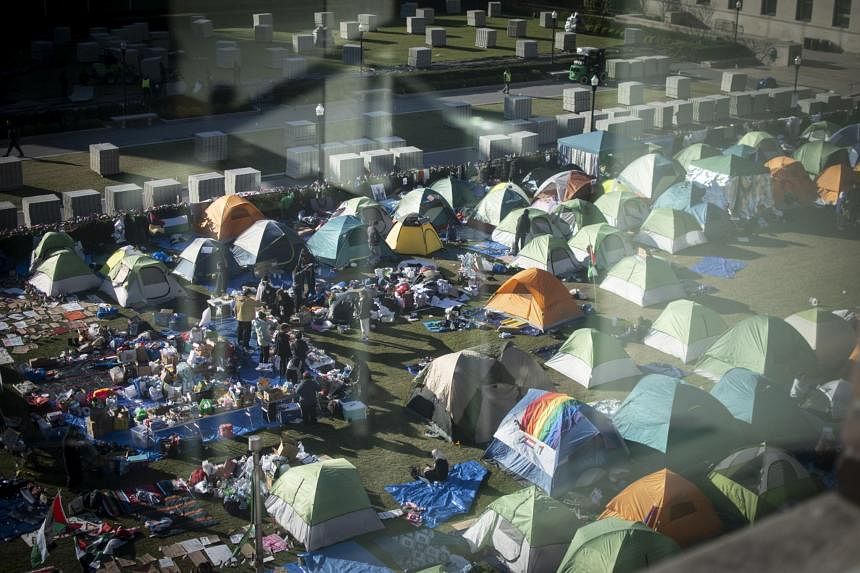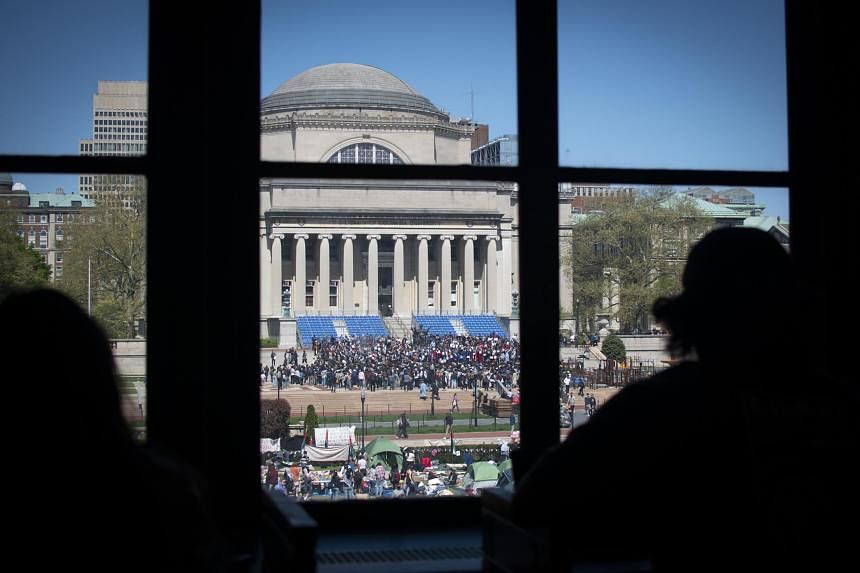NEW YORK – More than a week into pro-Palestinian protests on Columbia University’s campus, the air within and around its periphery remained tense. Discussions continued between the university administration and student organisers over the fate of the protests.
On April 24, the streets of 116th and Broadway were lined with New York Police Department (NYPD) officers, while students – school IDs in hand – were funnelled into campus grounds through a few gazetted entrance points with heightened security.
A deadline set for that day to decide on how to deal with the protests has since been given a 48-hour extension, which is set to elapse on April 26 at midnight local time (12pm on Saturday, Singapore time).
The peaceful protests began on April 17 when more than 100 pro-Palestinian students established the “Gaza Solidarity Encampment”, erecting small green tents on the university’s South Lawn.
The show of solidarity was an effort by more than 100 Columbia University student groups, which had come together to form the Columbia University Apartheid Divest coalition.
Their key demands were for the university to disclose all information on its financial investments and divest from all corporations profiting from the Israeli aggression in Gaza.
Israel is retaliating against the Palestinian militant group Hamas’ attack on Oct 7, which killed 1,200 people in Israel and led to more than 250 being taken hostage.
But Israel’s response has now been seen by many as having gone too far – the Gaza health authorities say Israel’s attacks have killed more than 34,000 people in Gaza since then.
On April 18, Columbia University president Minouche Shafik called in the NYPD. Police officers arrested more than 100 students – ostensibly for trespassing – and disassembled the tents.
Though the protest has been peaceful, Dr Shafik said in an e-mail to the Columbia community on April 18 that it “severely disrupts campus life, and creates a harassing and intimidating environment for many of our students”.
In response to the Columbia administration’s actions, encampments have since popped up on campuses around the US, including at the Massachusetts Institute of Technology, Yale University, New York University (NYU), University of Michigan, University of Southern California and University of Texas at Austin. These have declared solidarity with Palestine and Columbia students.
The police have also been called in to make arrests and break up encampments on campuses, including those at Yale and NYU, where students have issued calls for a permanent ceasefire in Gaza, an end to US military assistance for Israel, and amnesty for students and faculty staff who have been dismissed for protesting.
For Dr Shafik, her decision appears to have backfired. Instead of quelling the protests, the encampment re-emerged, larger than before.
Within the day of the police entering the Columbia campus, the new encampment popped up on the school’s adjacent West Lawn. Faculty members also rallied together, calling for amnesty for the students arrested.
Dr Shafik’s future at Columbia currently hangs in jeopardy, with the Barnard and Columbia chapter of the American Association of University Professors planning to call for her censure over the student arrests.
On the other hand, US House Speaker Mike Johnson, a Republican, has called for her resignation, as according to him, her actions have allowed anti-Semitism to flourish on campus.
Billionaire donors like Mr Robert Kraft and Mr Leon Cooperman are also weighing their support for the school, demanding that it end anti-Semitism on campus.
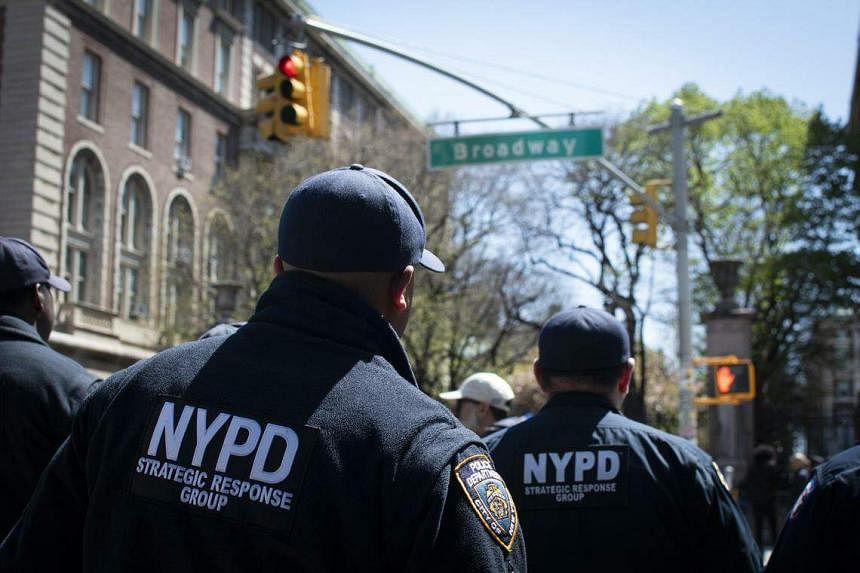
According to 22-year-old Jeffrey, a Singaporean sophomore at Columbia, donors’ demands are not at the top of most students’ minds.
“The situation is still evolving, and there are more pressing worries and concerns for students,” said Jeffrey, who declined to give his surname.
“There are people who are definitely very involved in what’s going on (in Gaza) and take a stance, but there are also people who are less concerned with the underlying issue driving this whole thing, but with how the school has reacted.”
Regardless of how outsiders may view them, within Columbia’s Gaza Solidarity Encampment, a picture of togetherness has been unfolding.
Each day, hundreds of students have filled the lawn for peer-led teach-ins on Palestine and Israel, and to watch, hear and bask in Palestinian songs, dance and poetry readings.
But as night fell on April 22 and 23, groups gathered around rainbow-shaped paper plates to participate in a Seder meal marking the start of the Jewish holiday of Passover.
“That was actually my first time being invited to a Passover Seder,” said Palestinian graduate student Jasmine Sarryeh-Jemersic, 34, who grew up Muslim.
“I don’t know if without this camp, I would have experienced other faiths and what their ceremonies are like.”
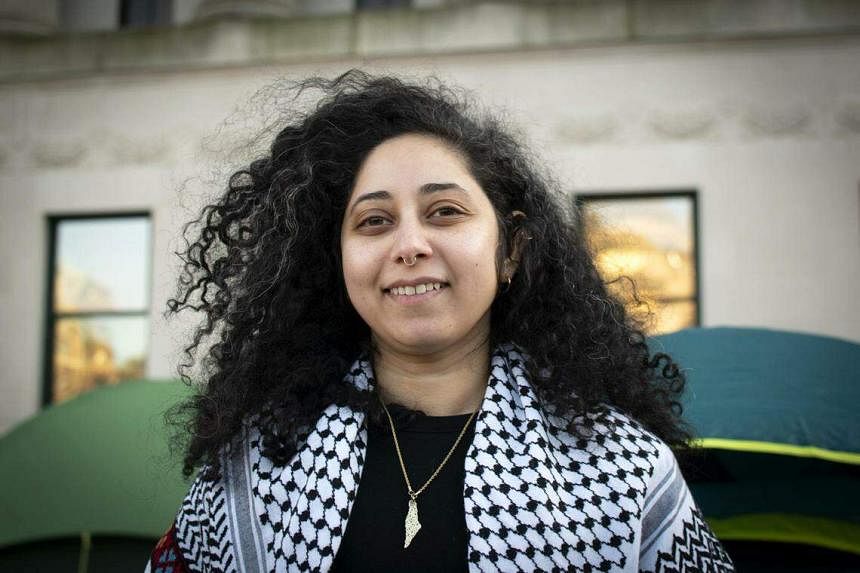
As they took part in the meal, students of different ethnicities and religions learnt about the significance of each of the components to Passover.
“I thought it was a great, beautiful demonstration of what it means to be free,” Ms Sarryeh-Jemersic said.
One of the organisers of the day’s Seder feast was Ms Hannah Sattler, 27. The graduate student, who is Jewish, studies at the Columbia School of International and Public Affairs. She had family members who perished in the Holocaust.
She was galvanised to join the protests – as the connection between hatred towards Jews and Palestinians was clear to her.
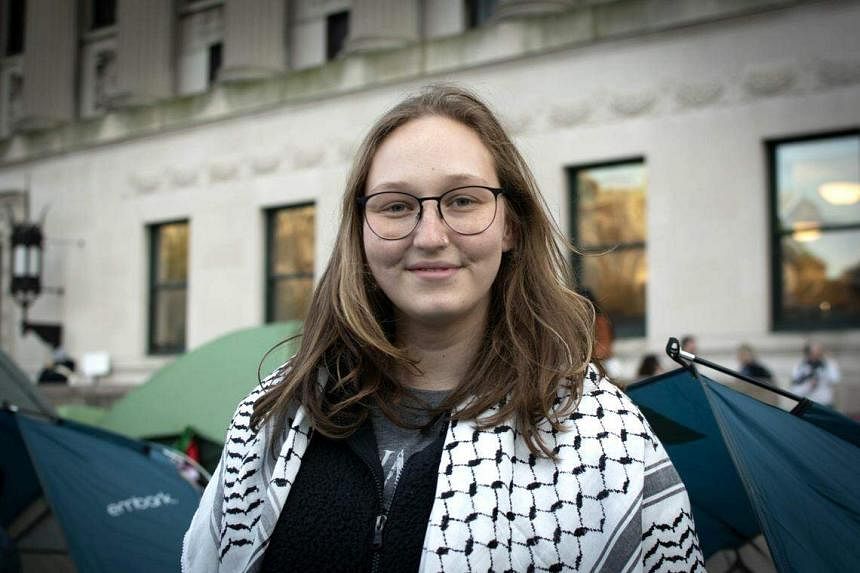
The mood on the Encampment is an inclusive and empathetic one, with people coming together in solidarity.
“The narrative that this is an unsafe space, or this is also an exclusive space – it’s so not. Like when you’re here, you know that’s not true, (and) can tell that it’s not true,” Ms Sattler said.
Outside the boundary of the West Lawn stood a lone protester – a blue and white Israeli flag draped across his shoulders.
After a foiled attempt to enter the Encampment, Mr Isidore Karten, a Columbia University alumnus who graduated in 2022, stood holding up a sign with the names and ages of six Israelis whom he said had been kidnapped by Hamas.
Columbia’s move to call in the NYPD was not harsh enough, he said.
“How bad can your punishment be, that you arrest a hundred people, and they come back the very next day? No one is penalised and (they) do the exact same thing,” Mr Karten said.
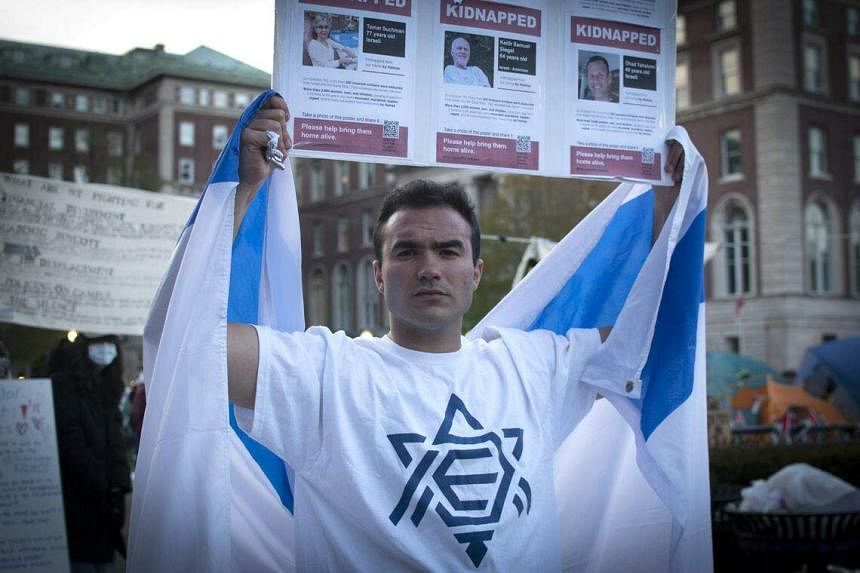
Mr Karten’s statement was not borne out by fact.
Since April 18, more than 50 arrested students from Barnard, an independently incorporated women’s college of Columbia University, have been booted off campus, their student IDs deactivated. They were evicted from their dorms and barred from accessing campus and online classes.
Singaporean student Yuk Yi, 21, a sophomore at Barnard College and a member of the school’s student government, has been working tirelessly to help return confiscated belongings to the displaced students. She has reunited the owners with their clothes, iPads and even an art journal.
She found the school’s response to be upsetting, especially for the suspended students who have lost access to shelter, food and their ability to attend ongoing classes.
“I don’t understand why we would pay US$90,000 (S$122,000) a year for our tuition, and not be able to just access our education,” said Yuk Yi, who declined to give her surname.
In contrast, she found the student body’s collective action to be deeply encouraging, she said.
“When I see a lot of these things happening, it feels very disheartening,” she said, adding: “But I am very proud that a lot of the students are able to at least stand up for themselves.”
For others such as senior Evelyn Yu, who studies economics at Barnard College, the top concern is the disruption to student life on campus.
An e-mail sent on April 22 by Professor Angela V. Olinto, the university’s provost, stated that classes will be hybrid for the remainder of the semester, which lasts till mid-May.
While Ms Yu is not involved in the protests and does not hold any “special political views”, she did not like how events had played out on campus.
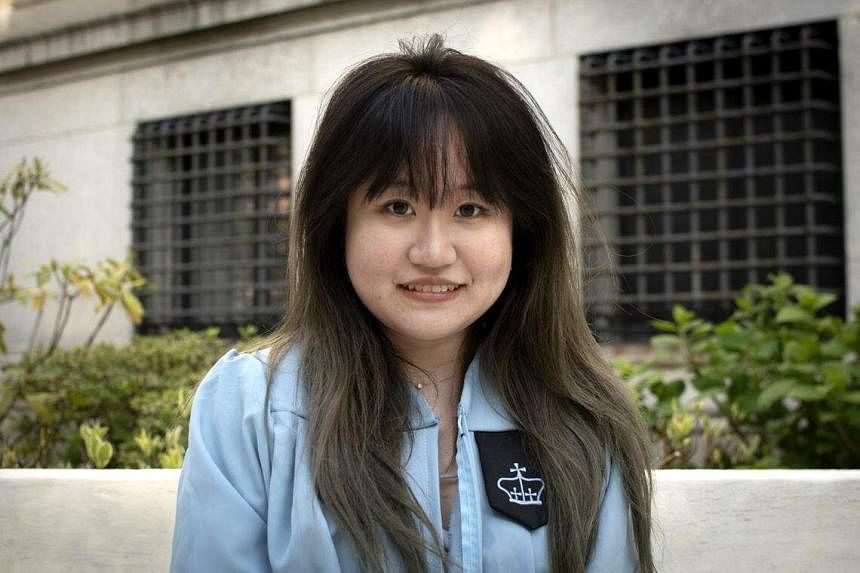
“I just feel that it is unfortunate that we are not experiencing our last class (in person), and also for commencement, it’s unsure if we are having that,” Ms Yu said.
Despite that, she empathises with the on-campus protesters.
“I think they (the student protesters) are doing the right thing, and also for our faculty members, they are also protecting their students,” Ms Yu said.
“It’s just (the) many extra consequences of having the NYPD get into this.”
